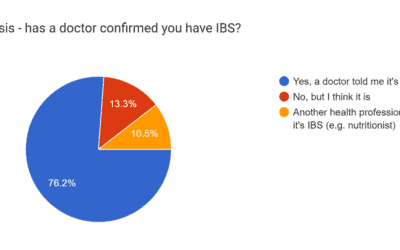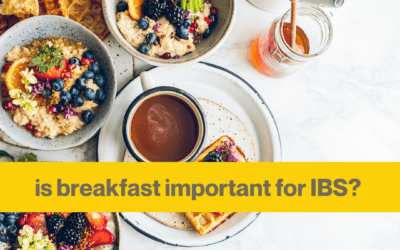Get off the toilet!
As an IBS nutritionist I work with people who are ready to address their bloating, excessive gas and spending too long sitting on their toilet.

If you’re exhausted by researching the best diet for IBS, or trying to work out which gut health tip to try next, then you’re in the right place.
IBS is a disorder of the gut-brain connection but this doesn’t mean it’s all in your head!
Typical IBS symptoms are constipation, bloating, abdominal pain, diarrhoea and excessive flatulence. All my clients have some combination of these.
Irritable Bowel Syndrome is a very complex condition, and as you’ve probably already realised there is no universal treatment pathway for everyone.
This means there is no medical cure for IBS, so management of the symptoms are down to diet, and lifestyle practices.
The most common different types of IBS are
- diarrhoea predominant,
- constipation predominant, or
- a mixed presentation of alternating bowel movement types.
Who is at risk for IBS?
Women are much more likely to have IBS, in fact around twice as likely! It’s thought this is linked to how menstrual hormones affect digestion but there may also be other factors.
IBS is often associated with mental health conditions such as depression or anxiety due to the link between the gut and the brain. This can affect motility, the speed of food through the gut, as well as hypersensitivity.
If you’ve had previous trauma or a difficult childhood you could be more at risk for digestive conditions such as IBS. You might also find you’re more likely to experience that dodgy tummy your parent also has because IBS does tend to run in the family! This could be genetic or linked family mental health, or family eating habits that get passed down.
People with eating disorders are also more likely to experience IBS. If you are currently, or have previously verly restricted your food intake, or frequently binged you could be at risk of IBS. Even if you eat a ‘normal’ amount of food if you’re only eating a very smaall range of the same foods you could develop IBS, due to lack of essential nutrient, issues with gut motility, or a lack of beneficial gut bacteria.
Common symptoms of IBS
The most common symptoms in IBS are bloating, diarrhoea or frequent loose stools, chronic constipation and abdominal pain.
We use something called the Rome IV Criteria to diagnose IBS. This is specific, and includes:
Recurrent abdominal pain on average at least 1 day/week in the last 3 months, associated with two or more of the following criteria:
- Related to defecation
- Associated with a change in frequency of stool
- Associated with a change in form (appearance) of stool
What causes IBS?
IBS is typically multi-factorial, meaning it’s not a single cause, and most people I work with have a few things that could be driving their symptoms.
- Post infectious IBS – A type of IBS I see frequently is post-infectious IBS. This is the onset of IBS symptoms after an incident of food poisoning. It can be up to around 18 months to 2 years later that the IBS starts, but typically around 3-6 months after the incident.
- IBS can be also caused by food intolerance, such as lactose intolerance, although this is less common than you think.
- Stress – whilst we can’t say stress ’causes’ IBS, it can definitely worsen symptoms. A key factor in your digestive health is your emotional and mental state. You’ve probably already heard about the important role of the gut-brain connection. I see high levels of chronic stress or anxiety causing all kinds of digestive issues including bloating, constipation and diarrhoea. This doesn’t mean it’s all in someone’s head, far from it! It follows that the support you need includes support to calm your nervous system as well as looking at food and eating habits.
- Hypersensitivity – it’s common for people with IBS to have visceral sensitivity. Hypersensitivity of the lining of your gut means your nervous system picks up on a normal amount of gas or distension, and relays this as heightened pain or sensitivity.
- Imbalances of gut bacteria can be a trigger for IBS symptoms. An overgrowth of bacteria can lead to fermentation of your food, and causing gas, bloating and diarrhoea. This can be changed through diet and lifestyle. Working on changing your gut bacteria can take a long time, and requires changes in eating habits, potentially adding to the gut bacteria, or reducing an overgrowth. Small Intestine bacterial overgrowth (SIBO) is one condition which causes IBS like symptoms.
Frequently asked questions about IBS
How I can help you as an IBS Nutritionist
I work with people who have IBS, SIBO, or unexplained bloating, constipation, gas or loose stools. As part of my signature programme the Gut Reset I will
- Assess your digestive symptoms, but also look at mood, skin health, sleep, weight, muscle / joint pain and other relevant symptoms
- Support you to find a diet that relieves the bloating, pains and gas
- Arrange for additional testing at home (if necessary, e.g. stool test or SIBO breath test) and help you understand the results
- Define a supplement plan for the 3 month Gut Reset programme and afterwards.
- Help you implement the dietary changes with recipe ideas and meal plans, as well as understanding nutrition better so you can create your own meal plans.
- Support you to eat a wider diet variety, reintroducing your eliminated foods again
- Support you with regular calls so you really understand what to focus on each week.
Work with me - IBS & SIBO Nutritionist
Book a free call to talk about working with me
The impact of IBS on daily life
The struggles of IBS: A new survey reveals the profound impact on daily life. I ran a survey with...
Taking amitriptyline for IBS
Have you been offered a low dose of amitriptyline for IBS? It's a antidepressant that's sometimes...
Why breakfast is important if you have IBS
Is breakfast the most important meal of the day? Many people I work say they just don’t feel...


